Age of Extremes, Atomic Bomb
No leaders emerged morally untouched from the Second World War, and, to end that war, the great democracy, America, had to confront a hideous moral dilemma of its own. The atomic bomb, catastrophic destruction to end all war.
The top-secret American operation to build and use the atom bomb would challenge the humanitarian values on which democracy was built. It was led by one of the most intriguing minds of the 20th century. J Robert Oppenheimer was a curious mix of a man. He was fascinated by other cultures and the religions of the East, and, in politics, a man of the left. In fact, he even flirted with communism before the war, and so you might think a strange choice to head a project like this.
Robert Oppenheimer
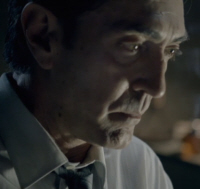
But he was a brilliant theoretical physicist and a charismatic leader. By the summer of 1945, Oppenheimer’s bomb, codenamed ‘Little Boy’, was ready. The target, Hiroshima.
After Germany’s defeat, Japan had fought on. Now Japanese civilians would pay for their leader’s refusal to surrender.
The strike was set for Monday, the 6th of August. There were American scientists who didn’t believe in deploying the bomb, but Oppenheimer argued strongly that it had to be used. There was a chance that the bomb would end all war, but, for that to happen, the whole world had to see its full horrific potential.
And so this man, with his cultured, sophisticated mind and his humanitarian values, spent a great deal of time calculating the exact height at which to detonate the bomb so that it would kill the maximum number of people.
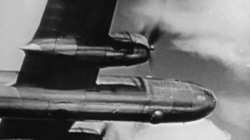
Robert Oppenheimer “This morning, at 8.16, Japanese time, a B-29 bomber was successfully deployed above Hiroshima.”
Hiroshima - Enola Gay
Hiroshima is a big word. This is a big story. Let’s try and bring it down in scale a bit. This is a woman’s watch, hands fused to the time of the blast. Around 400 young children were here with their 10 teachers when the bomb went off, and all but one was burned to death immediately.
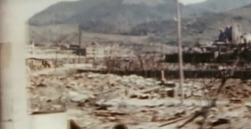
In a three-mile radius of the blast, almost everybody suffered fatal burns, and, beyond that, there were mass blindings from the flash, and then of course came the radiation sickness, killing many thousands in the days and weeks and years that followed.
Nagasaki - Little Boy
Stubbornly, incomprehensibly, Japan still refuse to surrender, so, three days later, a second atomic bomb was dropped, this time on Nagasaki. In the two attacks, up to a third of a million people died. Now Japan finally admitted defeat.
On the evening of the 14th of August, 1945, the Second World War came to an end.
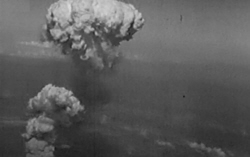
Then there are plenty of places around the world where terrible things happened. What makes this one different is the thought that what happened to Hiroshima could happen almost anywhere else.
I certainly grew up in the 1960s and 70s thinking that my home town in Scotland and the people I loved could be nuclear victims, and people were thinking just the same all across America and in Russia and France and Germany and many other places.
“We shall not repeat this evil” says the monument behind me.
But was this the end of something or was it the beginning? We still cannot be sure.
Dropping the atomic bomb changed the world for ever, and nobody felt the ambiguity of this more than its creator. A few weeks after words, Oppenheimer resigned his post on the nuclear programme. Later he reflected openly on his achievement.
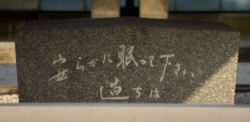
Robert Oppenheimer “We have made a thing, a most terrible weapon, that has altered abruptly and profoundly the nature of the world. A thing that, by all standards of the world that we grew up in, is an evil thing. And so by doing, we have raised the question of whether science is good for man.”
In later life, Oppenheimer described on television how he was haunted by a line he had once read in an ancient Hindu scripture. “Now I am become death, the destroyer of worlds. I suppose we all thought that one way or another.”
The nuclear arms race between communists and capitalists terrified the world. But the horrific promise of mutually assured destruction did preserve a fragile peace between the superpowers. It allowed the rival systems to test their own economic power, and in the West, the sheer energy of capitalism was unleashed as never before, producing a gushing abundance of goods, a colourful gloss of material plenty. It was a time when everything seemed possible. Even putting a man on the moon.
External Links
Robert Oppenheimer, Atomic Bomb - Wikipedia Page
